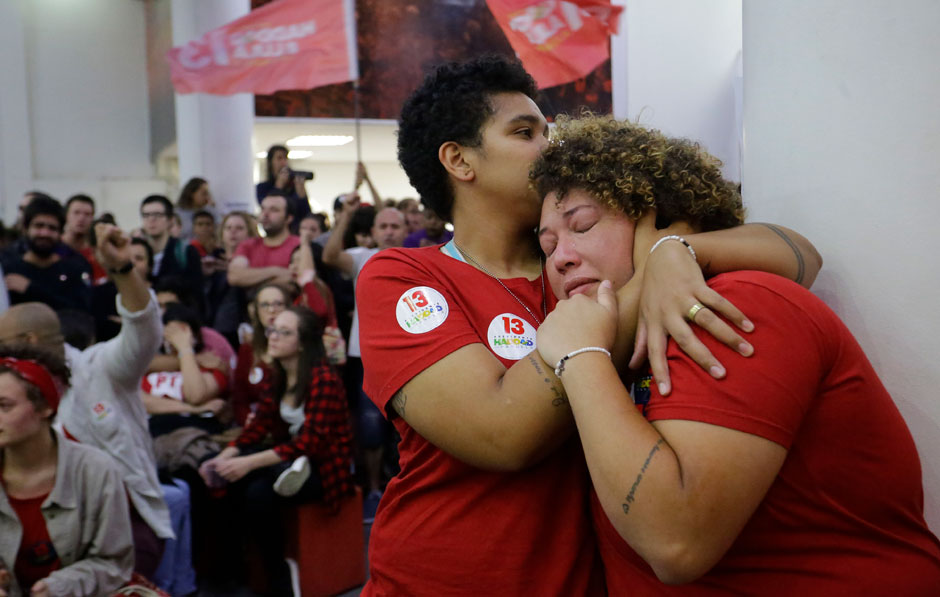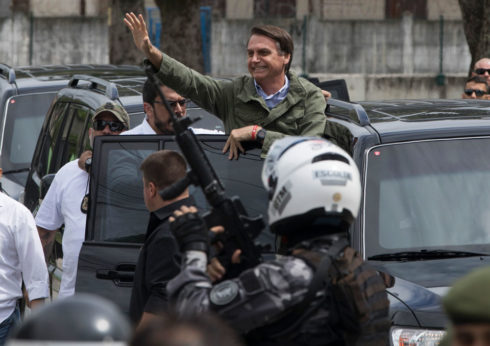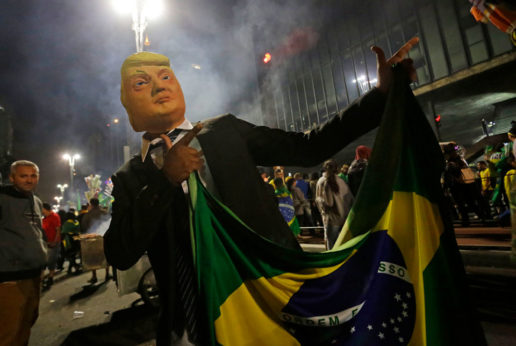
As expected, ultra-right candidate Jair Bolsonaro of the Social Liberal Party won Sunday’s second-round presidential elections in Brazil, with 55.1 percent of the vote over his rival, Fernando Haddad of the Workers’ Party’s 44.8 percent. The implications of this win for Brazil, for all of Latin America, and the world beyond are extremely ominous.
Brazil, with its 210 million inhabitants, is the largest country in Latin America and the fifth most populous country in the world (after China, India, the United States, and Indonesia). It has the eighth largest nominal Gross Domestic Product in the world, as well as oil, agribusiness, manufacturing, and even its own armaments industry.
Until an unconstitutional impeachment removed Dilma Rousseff of the Workers’ Party as president, Brazil was also a bulwark of progress internationally. The country was providing much needed economic help to the nations of Africa, and was the “B” in BRICs—Brazil, Russia, India, China—the grouping of major countries that were working to build an economic and trade counterweight to the United States, the European Union, and the other dominant capitalist powers. The overthrow of Rousseff and now the election of Bolsonaro may have completely dismantled that effort.
Though right-wing governments have taken control in a number of Latin American countries of late, and although the current government of Brazil is already right-wing, the arrival in power in the regional powerhouse is the biggest blow against democracy and the working class since the election of Trump in 2016.
How did this happen?
First, there was the aforementioned parliamentary coup against Rousseff, resulting from her impeachment and removal from power in August 2016. This brought to power the current president, Michel Temer, who immediately started reversing all the progressive social and economic policy initiatives of Rousseff and her predecessor, President Luiz Inácio Lula da Silva (2003-2011).

Temer’s regime quickly became one of the most unpopular in Brazilian history, as the social safety net was slashed and massive corruption scandals arose around him and his political allies. But there were corruption scandals involving the previous governments also, so the left did not benefit as much as it could have from Temer’s disgrace.
Lula was still the most popular political figure in Brazilian electoral politics because of the very real benefits his economic and social policies had brought, increasing the rights of women, Afro- and indigenous Brazilians, LGBTQ people, workers, and the poor. So the Workers’ Party and allies wanted to run him for president once more. But in April, Lula was jailed under dubious charges of corruption and money laundering. All efforts to get him released so he could run for president once more failed right before the first round of the presidential elections on October 7.
To replace Lula as their presidential candidate, the Workers’ Party chose former São Paulo Mayor Fernando Haddad, with former legislator Manuela d’Avila of the Communist Party of Brazil (Partido Comunista do Brasil, or PCdoB) as his vice presidential running mate. Polls had predicted that Bolsonaro would do well in the first round, but when the votes were tallied, he had done much better than expected: With 46.03 percent of the vote, he came close to winning the presidency without the need for a runoff. Haddad came in a distant second, with 29.28 percent of the vote. The rest of the vote was split among eleven other candidates.
So with just three weeks to go to the runoff, the Haddad campaign had to win over enough votes from left, centrist, and even conservative candidates to overcome Bolsonaro’s big head start. (Voting in Brazil is legally obligatory for people between 18 and 70 years of age.) Many of the candidates eliminated in the runoff were less than helpful, either refusing to endorse Haddad or working for Bolsonaro.
From the start, former candidate Guilherme Boulos from the PSOL (Socialism and Liberty) Party and the smaller Brazilian Communist Party, the Partido Comunista Brasileiro, immediately announced his support for Haddad and d’Avila. Ciro Gomes of the Democratic Labor Party and Marina Silva of the Sustainability Network eventually did also, but it was not enough. On the other hand, there were truly massive women’s and labor demonstrations against a possible Bolsonaro victory.
Bolsonaro and his vice presidential running mate, army general Hamilton Mourão, descended into the tactical gutter, but also gave clear warning as to what Brazil would be in store for if they won. Bolsonaro had been seriously injured in a stabbing attack on September 7, and this was used as a pretext not to participate in candidates’ debates even after he was long out of danger. The assailant had nothing to do with the opposition, but the incident was used to hint otherwise, i.e., that there was some sort of coordination between the assailant and Haddad’s Communist running mate, Manuela D’Avila.
The Haddad campaign complained of an avalanche of “fake news” circulated on social media, including bogus claims that Manuela d’Avila had shown up in a T-shirt with the words: “Jesus was a transvestite.” It was quickly shown to be photoshopped: The slogan on D’Avila’s shirt was really “rebel!” Violence, threats, and police harassment, including “investigations” carried out against academia, were also used by Bolsonaro’s supporters to suppress the opposition vote.
There were also a number of murders of Bolsonaro’s opponents during the campaign. The day before the runoff election, the son of an important woman trade union activist was shot dead at a Haddad rally by men believed to be Bolsonaro supporters.
Bolsonaro’s ferocious “tough on crime” line may have appealed to Brazilians worried about the very real erosion of personal security in the country, and the corruption issue also, no doubt, had an impact.
In addition, Bolsonaro got massive support from big business interests, from right-wing Evangelical Christian leaders and churches, and from sections of the military who, as he does, hanker after the days of the military dictatorship of 1964 to 1985, when military officers could steal, torture, and kill with impunity.
Bolsonaro’s Brazil
According to Bolsonaro, the only problem with repression under the dictatorship was that it did not kill enough people. He has promised to open up territory reserved for indigenous Brazilians—and for descendants living in escaped slave colonies, as well as nature reserves—to ruthless economic exploitation by agribusiness and mining interests. He has announced that Brazil will be a Christian country, and he will rule with the Bible alongside the constitution.

He has characterized Afro-Brazilians as fat and lazy and denounced the past government’s help to African countries, which he has described more or less in the same terms that President Trump has done. He has said he will pull Brazil out of the United Nations, which he considers to be a “den of communists,” and also out of the Paris Climate Agreement.
He has called for the jailing of members of the Landless People’s Movement, said he will get rid of the “reds,” joked about raping people, and said he would rather his son die than be gay. He will align Brazil with the United States and Israel.
These are attractive positions from the point of view of important sectors of the Brazilian and international ruling class. Perhaps for that reason, employers pressured and threatened their employees to vote for Bolsonaro.
An examination of the demographics and economics of the vote shows that Haddad’s support came from the poorest communities in Brazil, and Bolsonaro’s from the wealthiest areas. The geographical pattern of the vote also was revealing for its racial dimension: Haddad won the great majority of the states (of the 27 in Brazil) entirely in the Northeast region. This region is characterized by a lower percentage of Brazilians classified as “white,” i.e., of European origin, than other areas of Brazil where Bolsonaro won. For example in the Northeastern state of Maranhão, which has a Communist governor (Flávio Dino) and where whites are only 25.5 percent of the population, Haddad won. But in the state of Paraná, in the far south, whites are 73 percent, and Bolsonaro swept the state. The state of Pará, in the Northeast, is only 23 percent white, and went to Haddad, while Santa Catarina in the south, which is 87 percent white, went to Bolsonaro.
This suggests that lower income, working-class, and minority Brazilians still constitute the core of a fight back against whatever policies Bolsonaro will now impose. The Communist Party of Brazil pointed out in a post-election statement that the election results have profound implications for the whole of Latin America, and called for the unity of all progressive and democratic forces to push back against the growing fascist threat.












Comments